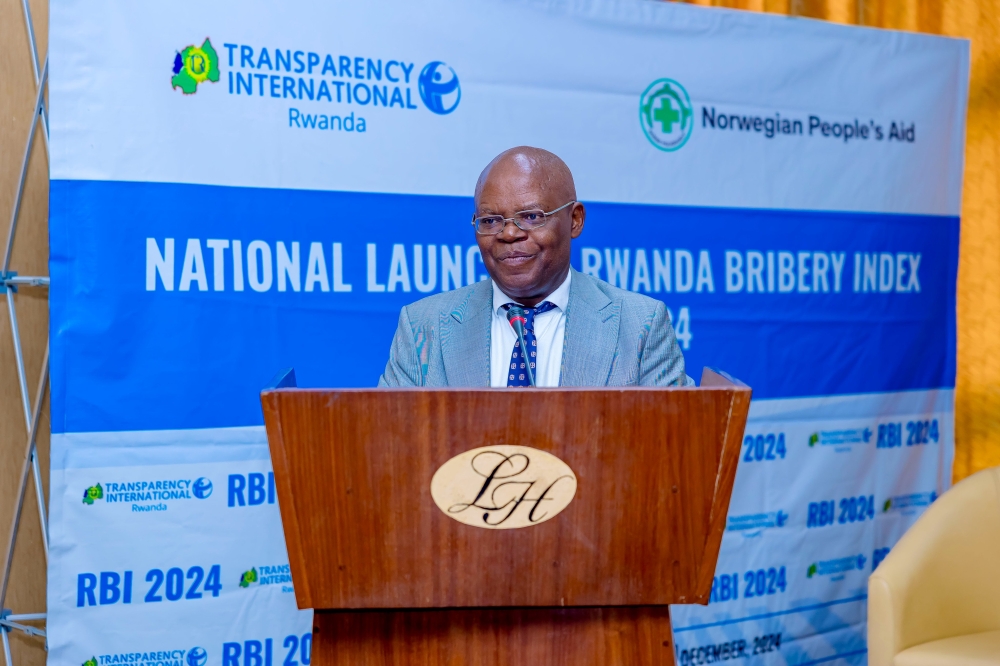

New findings published on December 11 indicate a slight decline in bribery encounters, by 18.50 percent in 2024 from 22 percent in 2023.
The 15th edition of the "Rwanda Bribery Index" (RBI), by Transparency International Rwanda (TI-Rwanda), which assesses the country's experiences and perceptions of bribery, attributes this downward trend to enhanced enforcement and accountability measures, underscoring progress in curbing corruption in Rwanda.
ALSO READ: Private sector, RURA, RNP urged to carry out customised anti-corruption awareness campaigns
The RBI 2024 survey sampled 2,396 respondents across Rwanda's four provinces and the City of Kigali, spanning 11 quasi-randomly selected districts. Key findings include aspects of corruption perception, government efforts, bribery encounters, and sectoral insight. In corruption perception, 59.20 percent of respondents consider corruption levels to be low in Rwanda (up from 50.84 percent in 2023) and 23.60 percent perceive corruption as medium-level, while 17.20 percent consider it high.
ALSO READ: The cost of corruption on economy and people's welfare
The private sector and Rwanda National Police (RNP) registered the highest likelihood of bribery at 13 percent and 9.40 percent, respectively.
However, the likelihood of bribery in the private sector showed a significant decline over the years, from 21.20 percent in 2022 to 15.60 percent in 2023 and 13 percent in 2024.
The national prevalence of bribery dropped to 2.10 percent in 2024, down from 2.60 percent in 2023.
Rwanda Energy Group (REG) had 6.60 percent, and the Water and Sanitation Corporation (WASAC), 5.90 percent, corruption prevalence rates.
The services most susceptible to corruption include illegal construction not aligned with the master plan (39.10 percent), obtaining a driving license (36.60 percent), acquiring a construction permit (33.50 percent), accessing water services (15.50 percent), and electricity services (16 percent).
Reporting challenges
The new report highlights bribery within the business community. Of 7.2 percent of the businesspeople who were asked to pay bribes in 2023, 3.4 percent eventually paid, with 32.6 percent of these payments made for business purposes.
Despite these findings, the report states, reporting bribery remains a significant challenge.
Alarmingly, it says, 92 percent of respondents who encountered bribery did not report it. Key reasons include: fear of self-incrimination (24.7 percent), lack of awareness about the need to report (19.2 percent), belief that no action would be taken (17.8 percent), lack of knowledge of reporting channels (16 percent), and fear of intimidation (11.50 percent)
"Breaking the silence around corruption starts with empowering citizens and ensuring safe and accessible reporting channels,” said Apollinaire Mupiganyi, the TI-Rwanda Executive Director.
"When 92 percent of those encountering bribery feel unable to report it, we must step up our efforts as anti-corruption actors. This means fostering trust, protecting whistleblowers, and building collaborative networks that encourage accountability from the grassroots to the highest levels. Together, we can turn challenges into opportunities for a corruption-free Rwanda.”
Marie Immaculée Ingabire, the Chairperson of TI-Rwanda, commended the government’s strides in combating corruption as reflected in RBI 2024 findings and other global indices such as Transparency International’s Corruption Perceptions Index (CPI).
She said: "However, challenges remain in addressing corruption in specific sectors, particularly in service delivery. All stakeholders must renew their commitment and adopt a collaborative approach to eradicate corruption.”


